Analysis, observations in Rauner-Quinn race for Governor
Analysis, observations in Rauner-Quinn race for Governor 5.00/5 (100.00%) 10 votes
Republican Bruce Rauner defeated Pat Quinn in part by concentrating on voters in suburban Cook County, and by defining a clearer message that connected with Illinois voters
By Ray Hanania
Bruce Rauner defeated Gov. Pat Quinn in a bitter race that saw campaign spending on both sides set new records.
The election wasn’t even close. And there is a reason. Several reasons, really. Money was only part of it. Rauner focused more on where the voters counted while Quinn seemed to rely on the cookie-cutter strategy of appealing to voters state-wide. The Sweep of Republicans nationwide also did not directly impact Illinois, a solid Blue Democratic state.
Rauner’s victory in Illinois is more than just Quinn losing the support of disenchanted voters. When you look at the data, seven things become very clear in the Quinn-Rauner battle:
The News Media failed voters again
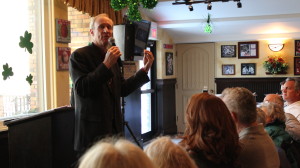
Illinois GOP nominee Bruce Rauner at rally organized by Gorman
The public didn’t buy into the partisanship of the Chicagoland mainstream media. They saw through their shallow, partisan analysis. They saw through the bias. Quinn was the favorite of the news media talking heads and political commentator “experts” – Laura Washington, Paul Green, Carol Marin, Paul Lisnek, and Chris Robling – who all predicted or argued strongly of Quinn’s “certain” victory. (In Robling’s case, his partisan Republican divisiveness played down one of Rauner’s key strengths among Republicans and conservative Democrats in Suburban Cook County.)
The political analysts proved to be partisan and out-of-touch, again. Honestly, in 40 years of covering elections, this past election was the worst analyzed in the history of Chicagoland politics. The views were partisan politically, and they reflected erroneous polling data rather than frontline experience. The commentators were bush-league. The phony issue of Dave McKinney was an attack strategy not an issue of journalism ethics. Rauner did no more to push McKinney out of a job than any Democrat has done to attack political writers they dislike. It happens all the time but the Democratic Chicago news media doesn’t focus on Chicagoland journalists attacked by Democrats.
The best TV analysis was offered on WLS TV with hosts Ron Magers and Cheryl Burton providing the best election night coverage of any TV station and offered a contrast of good and terrible political analysis. Magers and Burton tapped former Gov. Jim Edgar to fill in, while Laura Washington stumbled through her shock of seeing her favored candidate, Pat Quinn, lose the election so badly. Washington’s performance was one of the worst I have ever seen. Her most ridiculous comments she made was when she expressed surprise of Rauner’s “moderation” in his victory speech. Where was Washington? Beating a partisan media pavement.
But despite Laura Washington, Magers and Burton provided the best election night coverage of any TV station, although it was sad to see the shock int he face of WLS Political reporter Charles Thomas as the numbers proved his prediction wrong about a Quinn victory. Paul Meincke, who was given the second choice of the night (remember the media believed Quinn was going to win so Thomas was given the best assignment), covered the election night well finding himself where he probably didn’t expect to be, with the winners.
Inaccuracy of polling is so clear
Election polling has once again proven to be worthless. In 2010, nearly all of the polls predicted that Bill Brady would defeat Pat Quinn by margins of between 4 and 12 percent. Quinn won by .5 percent, or 32,000 total votes. This election, all of the polls predicted that Quinn had closed the gap and would defeat Rauner by as much as 4 percent, with the empty talking heads Washington-Green-Marin-Lisnek-Robling inaccurately predicting that the Libertarian candidate would siphon votes away from Rauner. Wrong.
Bill Kelly, a “Republican candidate for mayor,” was a major loser in this election, too. Kelly’s endorsement of Grimm actually cost Grimm votes and Grimm performed worse than the independents who ran in the 2010 election.
One major battle ground was Cook County’s suburbs
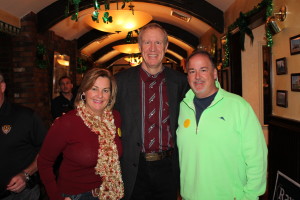
Liz Gorman, Bruce Rauner, Sean Morrison in March 2014
As in the past, the biased news media and even Pat Quinn ignored the one region that was fatal to Quinn’s campaign and necessary for any statewide victory, Suburban Cook County. The suburban Cook County vote, representing the region’s mildly conservative Democratic swing base (Reagan Democrats), didn’t vote in 2010. But they did in 2014, thanks in a large part to the efforts of Cook County Commissioner Elizabeth “Liz” Doody-Gorman.
Suburban Cook County is the home to the Reagan Democrats, mildly conservative Democrats who swing between their Democratic base and Republican choices. They vote for the best candidate. These Reagan Democrats couldn’t support Brady in 2010 because Brady was too conservative, and they didn’t support Quinn in 2010 because Quinn was too Liberal and historically he has ignored their issues and concerns. Quinn defeated Brady by 32,000 votes in 2010 mainly because these swing voters didn’t participate on either side.
In 2014, though, Rauner harvested those 32,000 votes working closely with Gorman, a populist who has built up her political popularity by fighting excessive taxation and singlehandedly bringing down the Todd Stroger 1 Center Sales Tax hike several years back.
Gorman worked with Rauner early on immediately after Rauner won the Republican Primary election in March and Rauner was loyal to her support. In fact, Gorman’s endorsement of Rauner in the March Republican Primary gave him his victory. Gorman helped Rauner with the primary and she helped Rauner build up the huge voter edge in Suburban Cook County that made Rauner’s General Election victory decisive. People forget that Rauner made a key choice to work with Gorman rather than the more conservative fanatic Republicans associated with Robling and his ilk.
The fact is that Quinn abandoned the Cook County Suburbs, too, and that was a major mistake on his part considering he won only four counties in 2010 out of 102 (Brady won 98 counties), and Cook County was the most crucial of them all. Several times, Democratic Party organizations held rallies in suburban Cook County where Quinn was supposed to appear. Quinn failed to show up at seven rallies I attended and you could hear the disgruntled voices among Democrats when he failed to appear.
Here is an important fact that shows starkly why Quinn lost. In addition to problems statewide, in the 2014 race, Quinn got 50,000 fewer votes in suburban Cook County than Senator Dick Durbin, who was in a tight race against Jim Oberweis.
And, Rauner got 70,000 more votes than Oberweis. That’s a spread of 120,000 votes that if Democrats could have shifted would have given Quinn the election. In fact, Quinn did worse than several of the state’s Democratic candidates.
Making the “Temporary” Income Tax Hike permanent
Most of the issues were on Rauner’s side, too. Although the media and commentators played havoc with a wide range of issues, one issue loomed heavily on voters in deciding the election for Bruce Rauner. Taxation.
Quinn orchestrated the 2011 hike in the State Income tax but PROMISED that it would be temporary.It became very clear, though, especially during the this election that Quinn was backing off that promise. That angered voters more than any other issue. Quinn planned to allow the Income Tax Hike to be extended permanently, breaking his promise to voters, but played a game saying that he would let the legislature decide Quinn tried to put the blame on the Illinois Democrats who, under House Speaker Michael J. Madigan, are strong enough to handle it.
Instead of addressing the issue head-on, Quinn pretended that the legislature would make the temporary tax permanent. But voters didn’t believe him. The looming Quinn plan to make the temporary Illinois Income Tax Hike permanent was a crucial issue he tried to blur but that voters saw through clearly. Many voters believed Quinn was not being honest about the Tax Hike. And that hurt him, especially among Suburban Cook County Voters.
How much money was spent?
The false flag issue of money spent. The 2014 governor’s race was not bought by money, as Paul Vallas, Quinn’s running mate, repeatedly asserted. It was lost by Quinn because of the issues. Money was important, but Quinn spent his share of campaign cash and went toe-to-toe with Rauner in the last 8 to 10 weeks of the election when it came to campaign spending. Rauner spent more than $65 million, including $27 million from his own pocket.
Quinn spent more than $35 million, During the last 10 weeks of the campaign, both campaigns spent an equal amount of money, according to several sources, about $25 million each. Rauner’s money was spent beginning two years ago to build up his name recognition to match Quinn’s spending.
But the hard fought election that had each side slamming the other with tough accusations in TV ads took place during that final 10 week stretch, with both candidates spending $25 million each on TV Ads throughout the state. Republicans have always outspent Democrats. In the 2010 election, Brady spent in excess of $20 million and Quinn spent $15 million.
Another way to compare spending is per voter. In 2010, Quinn spent $9 per vote cast while Brady spent $11.50 per vote cast. This election, 2014, Rauner spent $30 per vote but Quinn spent $18 per vote. But if you eliminate the pre-election campaign season spending, both spent an equal amount of money when it counted in the final 10 weeks of the 2014 election.
Rauner’s wife wins best Commercials of any election
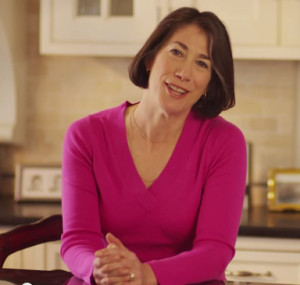
Diana Rauner
Rauner did a better job in campaign advertising. Rauner won because he avoided taking the bait and he didn’t lose his cool during the campaign or during the debates with Pat Quinn. Many thought Rauner would lose his tempter in public, and turn off voters. Quinn’s side was banking on that. That didn’t happen. Rauner was cool from day one and he maintained that coolness through the election.
More importantly, Rauner ran two of the most effective Ads ever and both included his wife, Diana Rauner who is a Democrat. Diana Rauner’s commercials successfully helped Rauner appeal not only to Reagan Democrats but also to women voters.
While Rauner presented his family life in a positive and appealing manner, Quinn pretty much kept his personal life hidden, causing many to wonder. Quinn is divorced and remained unmarried, with two sons. He should have presented his personal life more directly.Quinn’s campaign failed to address or present his personal life during the campaign, but voters wanted to know more about a candidate’s personal life. It could have been done with taste and effectiveness. That imbalance hurt Quinn.
Not addressing that did not help Quinn and it allowed Rauner’s ads to control the “family vote.” I would even argue that Quinn’s ads became more and more vicious and personal against Rauner towards the end. It turned voters off.
Mike Madigan is the undisputed Illinois Governor
A lot of people don’t like it but that’s too bad. The only person holding Illinois together is Mike Madigan, the Speaker of the Illinois House who held strong to his majority control of the Illinois House. Madigan is a brilliant leader and Illinois is in capable hands.
When Quinn and Paul Vallas picked up their marbles in anger late on Tuesday night refusing to concede defeat – one of the most unprofessional embarrassing moments in Illinois Political history – Rauner came on TV, acknowledged his victory and then announced brilliantly that he had made two phone calls. Not to pouting Governor Quinn or Paul Vallas but to powerful House Speaker Michael J. Madigan and Senate Majority Leader John Cullerton. Rauner recognizes that the future of Illinois rests in the ability of him and Madigan and Cullerton to work together.
Let’s hope they do.
Here’s some data for your review:
For Cook County data, visit:
http://electionnight.cookcountyclerk.com/
2014 Unofficial results
Governor 99 percent reporting
Rauner 1,741,472 50 percent
Quin 1,578,909 45 percent
Grimm 116,322 3 percent
2014 Cook County Suburban Vote
1673 precincts 100 percent
DEM - P Quinn & P Vallas 335,499 52.46%
REP - B Rauner & E Sanguinetti 291,881 45.64%
LIB - C Grimm & A Cummings 12,130 1.90%
Total 639,510
2014 Quinn got 50,000 fewer votes in suburban cook county than Durbin; And Rauner got 70,000 more votes than Oberweis
DEM - Richard J. Durbin 385,576 60.68%
REP - James D. Oberweis 229,859 36.17%
LIB - Sharon Hansen 20,017 3.15%
Total 635,452
2010 Cook County Brady-Quinn race
Registered voters Actual votes
2010 1,370,186 719,090 52.5%
2010 Suburban Cook Vote
DEM P Quinn 380,425
REP B Brady 280,175
2010 election Cook County
Governor & Lt Governor Cook Chicago Total Percentage
Pat Quinn
& Sheila Simon - DEM 380,425 520,413 900,838 64.33%
Bill Brady
& Jason Plummer - REP 280,175 120,110 400,285 28.58%
Rich Whitney
& Don W. Crawford - GRN 17,397 17,697 35,094 2.51%
Lex Green
& Ed Rutledge - LIB 5,668 4,859 10,527 0.75%
Scott Lee Cohen
& Baxter B. Swilley - IND 25,624 26,872 52,496 3.75%
write-in 427 695 1,122 0.08%
TOTALS 709,716 690,646 1,400,362
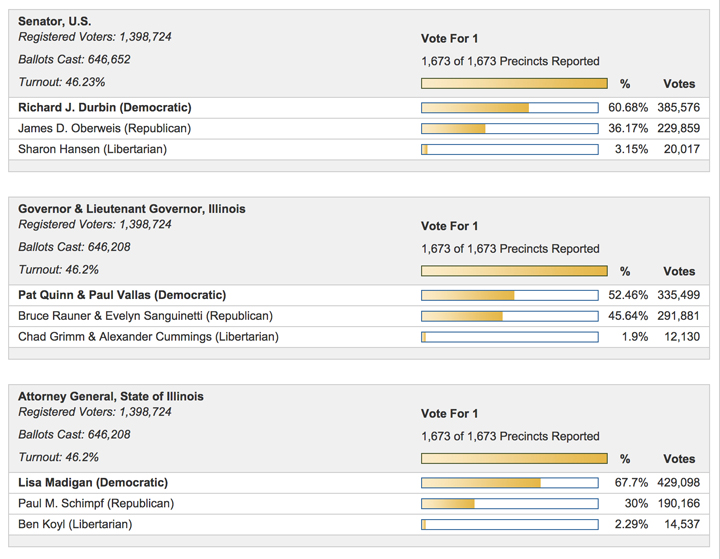
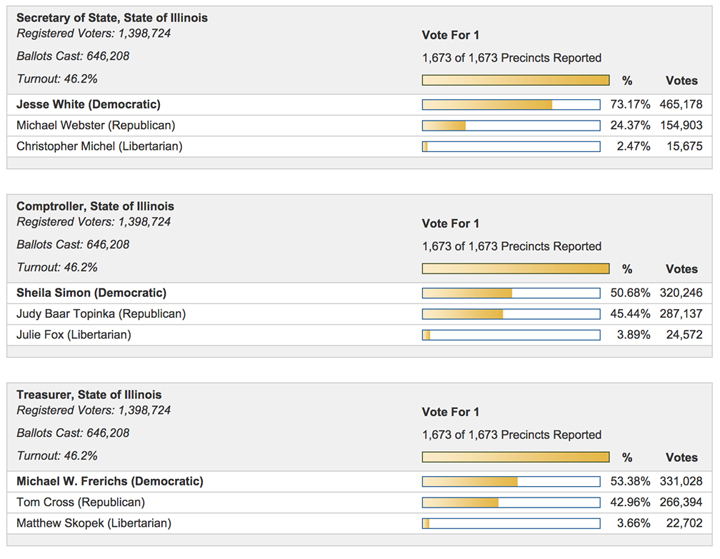
(Ray Hanania is an award winning former Chicago City Hall reporter and political columnist. Email him at [email protected].)

Blogger, Columnist at Illinois News Network Online
Ray Hanania is senior blogger for the Illinois News Network online news site. He is an award winning former Chicago City Hall political reporter and columnist who covered the beat from 1976 through 1992 (From Mayor Daley to Mayor Daley).
In 1976, he was hired by the Chicago community newspaper The Southtown Economist (Daily Southtown) and in 1985 was hired by the Chicago Sun-Times and covered Chicago City Hall for both. In 1993, he launched the “The Villager” Newspapers which covered 12 Southwest Chicagoland suburban regions. He hosted a live weekend Radio Show on WLS AM radio from 1980 through 1991, and also on WBBM FM, WLUP FM and shows on WSBC AM in Chicago and WNZK AM in Detroit.
Hanania is the recipient of four (4) Chicago Headline Club “Peter Lisagor Awards” for Column writing. In November 2006, he was named “Best Ethnic American Columnist” by the New American Media;In 2009, he received the prestigious Sigma Delta Chi Award for Writing from the Society of Professional Journalists. Hanania has also received two (2) Chicago Stick-o-Type awards from the Chicago Newspaper Guild, and in 1990 was nominated by the Chicago Sun-Times for a Pulitzer Prize for his four-part series on the Palestinian Intifada.
Hanania’s writings have been published in newspapers around the world. He currently is syndicated through Creators Syndicate and his column is feature every Sunday in the Saudi Gazette in Saudi Arabia. He has written for the Jerusalem Post, YNetNews.com, Newsday in New York, the Orlando Sentinel, the Houston Chronicle, The Daily Star, the News of the World, the Daily Yomimuri in Tokyo, Chicago Magazine, the Arlington Heights Daily Herald, and Aramco Magazine. His Chicagoland political columns are published in the Southwest News-Herald and Des Plaines Valley News on several Chicagoland blogs including the OrlandParker.com and SuburbanChicagoland.com.
Hanania is the President/CEO of Urban Strategies Group media and public affairs consulting which has clients in Illinois, Florida, Michigan and Washington D.C.
His personal website is www.TheMediaOasis.com. Email him at:
[email protected].
Latest posts by Ray Hanania (see all)
Related
 Blog Posts
Blog Posts


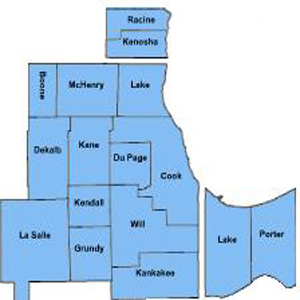



Analysis, observations in Rauner-Quinn race for Governor
Republican Bruce Rauner defeated Pat Quinn in part by concentrating on voters in suburban Cook County, and by defining a clearer message that connected with Illinois voters
By Ray Hanania
Bruce Rauner defeated Gov. Pat Quinn in a bitter race that saw campaign spending on both sides set new records.
The election wasn’t even close. And there is a reason. Several reasons, really. Money was only part of it. Rauner focused more on where the voters counted while Quinn seemed to rely on the cookie-cutter strategy of appealing to voters state-wide. The Sweep of Republicans nationwide also did not directly impact Illinois, a solid Blue Democratic state.
Rauner’s victory in Illinois is more than just Quinn losing the support of disenchanted voters. When you look at the data, seven things become very clear in the Quinn-Rauner battle:
The News Media failed voters again
Illinois GOP nominee Bruce Rauner at rally organized by Gorman
The public didn’t buy into the partisanship of the Chicagoland mainstream media. They saw through their shallow, partisan analysis. They saw through the bias. Quinn was the favorite of the news media talking heads and political commentator “experts” – Laura Washington, Paul Green, Carol Marin, Paul Lisnek, and Chris Robling – who all predicted or argued strongly of Quinn’s “certain” victory. (In Robling’s case, his partisan Republican divisiveness played down one of Rauner’s key strengths among Republicans and conservative Democrats in Suburban Cook County.)
The political analysts proved to be partisan and out-of-touch, again. Honestly, in 40 years of covering elections, this past election was the worst analyzed in the history of Chicagoland politics. The views were partisan politically, and they reflected erroneous polling data rather than frontline experience. The commentators were bush-league. The phony issue of Dave McKinney was an attack strategy not an issue of journalism ethics. Rauner did no more to push McKinney out of a job than any Democrat has done to attack political writers they dislike. It happens all the time but the Democratic Chicago news media doesn’t focus on Chicagoland journalists attacked by Democrats.
The best TV analysis was offered on WLS TV with hosts Ron Magers and Cheryl Burton providing the best election night coverage of any TV station and offered a contrast of good and terrible political analysis. Magers and Burton tapped former Gov. Jim Edgar to fill in, while Laura Washington stumbled through her shock of seeing her favored candidate, Pat Quinn, lose the election so badly. Washington’s performance was one of the worst I have ever seen. Her most ridiculous comments she made was when she expressed surprise of Rauner’s “moderation” in his victory speech. Where was Washington? Beating a partisan media pavement.
But despite Laura Washington, Magers and Burton provided the best election night coverage of any TV station, although it was sad to see the shock int he face of WLS Political reporter Charles Thomas as the numbers proved his prediction wrong about a Quinn victory. Paul Meincke, who was given the second choice of the night (remember the media believed Quinn was going to win so Thomas was given the best assignment), covered the election night well finding himself where he probably didn’t expect to be, with the winners.
Inaccuracy of polling is so clear
Election polling has once again proven to be worthless. In 2010, nearly all of the polls predicted that Bill Brady would defeat Pat Quinn by margins of between 4 and 12 percent. Quinn won by .5 percent, or 32,000 total votes. This election, all of the polls predicted that Quinn had closed the gap and would defeat Rauner by as much as 4 percent, with the empty talking heads Washington-Green-Marin-Lisnek-Robling inaccurately predicting that the Libertarian candidate would siphon votes away from Rauner. Wrong.
Bill Kelly, a “Republican candidate for mayor,” was a major loser in this election, too. Kelly’s endorsement of Grimm actually cost Grimm votes and Grimm performed worse than the independents who ran in the 2010 election.
One major battle ground was Cook County’s suburbs
Liz Gorman, Bruce Rauner, Sean Morrison in March 2014
As in the past, the biased news media and even Pat Quinn ignored the one region that was fatal to Quinn’s campaign and necessary for any statewide victory, Suburban Cook County. The suburban Cook County vote, representing the region’s mildly conservative Democratic swing base (Reagan Democrats), didn’t vote in 2010. But they did in 2014, thanks in a large part to the efforts of Cook County Commissioner Elizabeth “Liz” Doody-Gorman.
Suburban Cook County is the home to the Reagan Democrats, mildly conservative Democrats who swing between their Democratic base and Republican choices. They vote for the best candidate. These Reagan Democrats couldn’t support Brady in 2010 because Brady was too conservative, and they didn’t support Quinn in 2010 because Quinn was too Liberal and historically he has ignored their issues and concerns. Quinn defeated Brady by 32,000 votes in 2010 mainly because these swing voters didn’t participate on either side.
In 2014, though, Rauner harvested those 32,000 votes working closely with Gorman, a populist who has built up her political popularity by fighting excessive taxation and singlehandedly bringing down the Todd Stroger 1 Center Sales Tax hike several years back.
Gorman worked with Rauner early on immediately after Rauner won the Republican Primary election in March and Rauner was loyal to her support. In fact, Gorman’s endorsement of Rauner in the March Republican Primary gave him his victory. Gorman helped Rauner with the primary and she helped Rauner build up the huge voter edge in Suburban Cook County that made Rauner’s General Election victory decisive. People forget that Rauner made a key choice to work with Gorman rather than the more conservative fanatic Republicans associated with Robling and his ilk.
The fact is that Quinn abandoned the Cook County Suburbs, too, and that was a major mistake on his part considering he won only four counties in 2010 out of 102 (Brady won 98 counties), and Cook County was the most crucial of them all. Several times, Democratic Party organizations held rallies in suburban Cook County where Quinn was supposed to appear. Quinn failed to show up at seven rallies I attended and you could hear the disgruntled voices among Democrats when he failed to appear.
Here is an important fact that shows starkly why Quinn lost. In addition to problems statewide, in the 2014 race, Quinn got 50,000 fewer votes in suburban Cook County than Senator Dick Durbin, who was in a tight race against Jim Oberweis.
And, Rauner got 70,000 more votes than Oberweis. That’s a spread of 120,000 votes that if Democrats could have shifted would have given Quinn the election. In fact, Quinn did worse than several of the state’s Democratic candidates.
Making the “Temporary” Income Tax Hike permanent
Most of the issues were on Rauner’s side, too. Although the media and commentators played havoc with a wide range of issues, one issue loomed heavily on voters in deciding the election for Bruce Rauner. Taxation.
Quinn orchestrated the 2011 hike in the State Income tax but PROMISED that it would be temporary.It became very clear, though, especially during the this election that Quinn was backing off that promise. That angered voters more than any other issue. Quinn planned to allow the Income Tax Hike to be extended permanently, breaking his promise to voters, but played a game saying that he would let the legislature decide Quinn tried to put the blame on the Illinois Democrats who, under House Speaker Michael J. Madigan, are strong enough to handle it.
Instead of addressing the issue head-on, Quinn pretended that the legislature would make the temporary tax permanent. But voters didn’t believe him. The looming Quinn plan to make the temporary Illinois Income Tax Hike permanent was a crucial issue he tried to blur but that voters saw through clearly. Many voters believed Quinn was not being honest about the Tax Hike. And that hurt him, especially among Suburban Cook County Voters.
How much money was spent?
The false flag issue of money spent. The 2014 governor’s race was not bought by money, as Paul Vallas, Quinn’s running mate, repeatedly asserted. It was lost by Quinn because of the issues. Money was important, but Quinn spent his share of campaign cash and went toe-to-toe with Rauner in the last 8 to 10 weeks of the election when it came to campaign spending. Rauner spent more than $65 million, including $27 million from his own pocket.
Quinn spent more than $35 million, During the last 10 weeks of the campaign, both campaigns spent an equal amount of money, according to several sources, about $25 million each. Rauner’s money was spent beginning two years ago to build up his name recognition to match Quinn’s spending.
But the hard fought election that had each side slamming the other with tough accusations in TV ads took place during that final 10 week stretch, with both candidates spending $25 million each on TV Ads throughout the state. Republicans have always outspent Democrats. In the 2010 election, Brady spent in excess of $20 million and Quinn spent $15 million.
Another way to compare spending is per voter. In 2010, Quinn spent $9 per vote cast while Brady spent $11.50 per vote cast. This election, 2014, Rauner spent $30 per vote but Quinn spent $18 per vote. But if you eliminate the pre-election campaign season spending, both spent an equal amount of money when it counted in the final 10 weeks of the 2014 election.
Rauner’s wife wins best Commercials of any election
Diana Rauner
Rauner did a better job in campaign advertising. Rauner won because he avoided taking the bait and he didn’t lose his cool during the campaign or during the debates with Pat Quinn. Many thought Rauner would lose his tempter in public, and turn off voters. Quinn’s side was banking on that. That didn’t happen. Rauner was cool from day one and he maintained that coolness through the election.
More importantly, Rauner ran two of the most effective Ads ever and both included his wife, Diana Rauner who is a Democrat. Diana Rauner’s commercials successfully helped Rauner appeal not only to Reagan Democrats but also to women voters.
While Rauner presented his family life in a positive and appealing manner, Quinn pretty much kept his personal life hidden, causing many to wonder. Quinn is divorced and remained unmarried, with two sons. He should have presented his personal life more directly.Quinn’s campaign failed to address or present his personal life during the campaign, but voters wanted to know more about a candidate’s personal life. It could have been done with taste and effectiveness. That imbalance hurt Quinn.
Not addressing that did not help Quinn and it allowed Rauner’s ads to control the “family vote.” I would even argue that Quinn’s ads became more and more vicious and personal against Rauner towards the end. It turned voters off.
Mike Madigan is the undisputed Illinois Governor
A lot of people don’t like it but that’s too bad. The only person holding Illinois together is Mike Madigan, the Speaker of the Illinois House who held strong to his majority control of the Illinois House. Madigan is a brilliant leader and Illinois is in capable hands.
When Quinn and Paul Vallas picked up their marbles in anger late on Tuesday night refusing to concede defeat – one of the most unprofessional embarrassing moments in Illinois Political history – Rauner came on TV, acknowledged his victory and then announced brilliantly that he had made two phone calls. Not to pouting Governor Quinn or Paul Vallas but to powerful House Speaker Michael J. Madigan and Senate Majority Leader John Cullerton. Rauner recognizes that the future of Illinois rests in the ability of him and Madigan and Cullerton to work together.
Let’s hope they do.
Here’s some data for your review:
For Cook County data, visit:
http://electionnight.cookcountyclerk.com/
2014 Unofficial results
Governor 99 percent reporting
Rauner 1,741,472 50 percent
Quin 1,578,909 45 percent
Grimm 116,322 3 percent
2014 Cook County Suburban Vote
1673 precincts 100 percent
DEM - P Quinn & P Vallas 335,499 52.46%
REP - B Rauner & E Sanguinetti 291,881 45.64%
LIB - C Grimm & A Cummings 12,130 1.90%
Total 639,510
2014 Quinn got 50,000 fewer votes in suburban cook county than Durbin; And Rauner got 70,000 more votes than Oberweis
DEM - Richard J. Durbin 385,576 60.68%
REP - James D. Oberweis 229,859 36.17%
LIB - Sharon Hansen 20,017 3.15%
Total 635,452
2010 Cook County Brady-Quinn race
Registered voters Actual votes
2010 1,370,186 719,090 52.5%
2010 Suburban Cook Vote
DEM P Quinn 380,425
REP B Brady 280,175
2010 election Cook County
Governor & Lt Governor Cook Chicago Total Percentage
Pat Quinn
& Sheila Simon - DEM 380,425 520,413 900,838 64.33%
Bill Brady
& Jason Plummer - REP 280,175 120,110 400,285 28.58%
Rich Whitney
& Don W. Crawford - GRN 17,397 17,697 35,094 2.51%
Lex Green
& Ed Rutledge - LIB 5,668 4,859 10,527 0.75%
Scott Lee Cohen
& Baxter B. Swilley - IND 25,624 26,872 52,496 3.75%
write-in 427 695 1,122 0.08%
TOTALS 709,716 690,646 1,400,362
(Ray Hanania is an award winning former Chicago City Hall reporter and political columnist. Email him at [email protected].)
Ray Hanania
In 1976, he was hired by the Chicago community newspaper The Southtown Economist (Daily Southtown) and in 1985 was hired by the Chicago Sun-Times and covered Chicago City Hall for both. In 1993, he launched the “The Villager” Newspapers which covered 12 Southwest Chicagoland suburban regions. He hosted a live weekend Radio Show on WLS AM radio from 1980 through 1991, and also on WBBM FM, WLUP FM and shows on WSBC AM in Chicago and WNZK AM in Detroit.
Hanania is the recipient of four (4) Chicago Headline Club “Peter Lisagor Awards” for Column writing. In November 2006, he was named “Best Ethnic American Columnist” by the New American Media;In 2009, he received the prestigious Sigma Delta Chi Award for Writing from the Society of Professional Journalists. Hanania has also received two (2) Chicago Stick-o-Type awards from the Chicago Newspaper Guild, and in 1990 was nominated by the Chicago Sun-Times for a Pulitzer Prize for his four-part series on the Palestinian Intifada.
Hanania’s writings have been published in newspapers around the world. He currently is syndicated through Creators Syndicate and his column is feature every Sunday in the Saudi Gazette in Saudi Arabia. He has written for the Jerusalem Post, YNetNews.com, Newsday in New York, the Orlando Sentinel, the Houston Chronicle, The Daily Star, the News of the World, the Daily Yomimuri in Tokyo, Chicago Magazine, the Arlington Heights Daily Herald, and Aramco Magazine. His Chicagoland political columns are published in the Southwest News-Herald and Des Plaines Valley News on several Chicagoland blogs including the OrlandParker.com and SuburbanChicagoland.com.
Hanania is the President/CEO of Urban Strategies Group media and public affairs consulting which has clients in Illinois, Florida, Michigan and Washington D.C.
His personal website is www.TheMediaOasis.com. Email him at: [email protected].
Latest posts by Ray Hanania (see all)
Share this:
Related